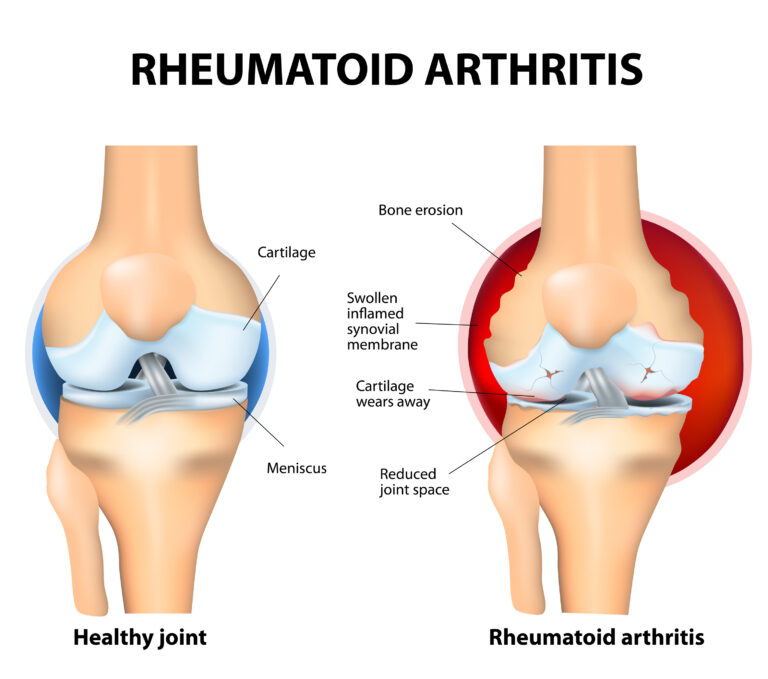Rheumatoid Arthritis is an autoimmune disorder that affects about 2 million Americans. It is characterized by the body’s immune defenses’ inability to differentiate between normal healthy cells and foreign invaders. It behaves as if normal cells need to be destroyed. The joints begin to deteriorate as the cartilage breaks down. Then inflammation (a normally protective mechanism) sets in and the pain becomes evident.
“RA” is more serious than osteoarthritis as it not only affects the joints, but also the muscles, tendons and other tissues. Also because it is an immune system disorder, versus the osteo form which is limited to “just” joint degeneration. In addition to the common achiness, pain and stiffness, RA can also be accompanied by fatigue, low grade fever and small nodules that form under the skin.
Our lifestyle many times sets the stage for RA to occur. There is no proven genetic link, although it can run in families, and is suspected to be the result of lifestyle transfer rather than genetic transfer.
What we eat can either be contributory or preventative. Certain fats, for instance, are very beneficial to RA because they can be converted to the hormones that reduce inflammation and pain. On the other hand, certain fats, such as trans-fats actually contribute to inflammation. Other substances we consume that are classified as “pro-inflammatory foods” include sugar, coffee and for many people wheat as well. Then we also have the “nightshade” vegetables that seem to aggravate arthritis. These include tomatoes, potatoes, eggplant and peppers.
Foods that tend to be helpful are vegetables in general, as well as easy to digest proteins. While we’re on the subject, healthy digestion is critical to the prevention and treatment of all forms of arthritis – possibly the most important component.
Although there are many medications that RA sufferers swear by and feel they can’t live without, there are also several herbs and other supplements with great benefits as well.
RA is frequently treated by managing the pain and inflammation, however, unless the immune dysfunction is handled simultaneously, the dependence upon medications for control becomes a lifetime endeavor.
In a Johns Hopkins Health Alert report they reported that acupuncture has been found to be beneficial for RA and recommends acupuncture as an adjunctive treatment. Many people don’t like the side effects of medications and choose acupuncture as a standalone treatment and they are quite pleased with the results. In Arthritis Today (the periodical of The Arthritis Foundation), it discusses the mechanism of acupuncture, in addition to the effectiveness: “It helps regulate the body’s nervous system, which can stimulate the release of natural pain-fighting endorphins…Acupuncture also alters the perception of pain…Brain magnetic resonance imaging shows that needling of acupuncture points deactivates the part of the brain that deals with our perception of pain.”
This only discusses the pain perspective. Acupuncture also improves immune function. In several studies Acupuncture has been demonstrated to be effective in improving many immune deficiency diseases.
While many people feel they are stuck with this often times debilitating condition, there is hope. There is help.
©2009 Holly A. Carling, O.M.D., L.Ac., Ph.D.







